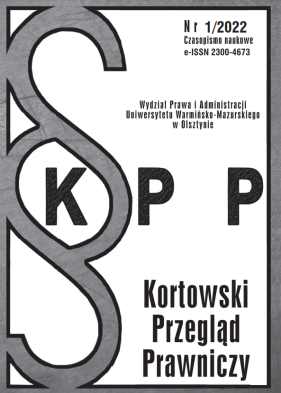Kilka słów o formie orzeczeń w przedmiocie naprawienia szkody lub zadośćuczynienia za doznaną krzywdę
oraz forum właściwym do ich wydania w polskim postępowaniu karnym
A few words about the form of judgments on compensation for dama- ge and non-pecuniary damage and the forum competent to issue them in criminal proceedings
Author(s): Patrycja BróżekSubject(s): Criminal Law
Published by: Wydawnictwo Uniwersytetu Warmińsko-Mazurskiego w Olsztynie
Keywords: criminal law; obligation to redress the damage; compensation; consensualism; damage; 46 of the Penal Code; conditional discontinuation of the proceedings; conditional suspension of the sentence;
Summary/Abstract: The obligation to make reparation can only be imposed on the offender on the basis of the relevant judgment and is an integral part of it. Depending on the nature in which it is applied in concreto, i.e. whether as a compensatory measure or as a probationary condition, and sometimes also depending on the procedural advancement of the case or on the various possible ways of ending the proceedings in a specific case, the ruling imposing it may be made at a hearing or at a session. In addition to the possibility of adjudicating it as a compensatory measure under Article 46 of the Criminal Code, this obligation may also be adjudicated as a probationary measure. The purpose of this publication is to draw attention to some important issues related to the forum and form of decisions on compensation of damage and harm in the course of a criminal trial. Currently, this institution has acquired a decidedly more civilized character, but it still has, to some extent, a penological (educational) function, especially when applied as a probationary condition. If the court in concreto applies such an obligation, it should in each case precisely specify the scope of the obligation to make reparation (in whole or in part), indicate the amount of damage inflicted by the perpetrator, the person entitled, the specific manner in which the damage or harm will be compensated, and possibly specify whether the payment will be spread in instalments (and if so, what will be the deadlines for their repayment). The rule should be that the perpetrator of the crime is obliged to compensate for the damage in full, while exceptions to this rule should be justified by important reasons. It should be noted that the Penal Code does not, in principle, contain any provisions which would regulate the principles of adjudicating on compensation of damages in penal law (Article 46 of the Penal Code refers to the provi- sions of civil law); therefore, at present, such provisions of civil law as e.g. Article 361 § 1 of the Civil Code, 362 § 2 of the Civil Code, 362 of the Civil Code, 440 of the Civil Code are applicable here. It should also be noted that imposing the obligation to redress damage on the perpetrator on the basis of Article 46 of the Code of Criminal Procedure is possible in the case of convicting the perpetrator, whereas he/she cannot be convicted of a time-barred crime. It should therefore be noted that as long as a conviction is an important prerequisite for imposing such an obligation as a compensation measure, the provisions of the Criminal Code regulating the issue of the statute of limitations for a criminal offence are still of particular importance here.
Journal: Kortowski Przegląd Prawniczy
- Issue Year: 2022
- Issue No: 1
- Page Range: 5-18
- Page Count: 14
- Language: Polish

